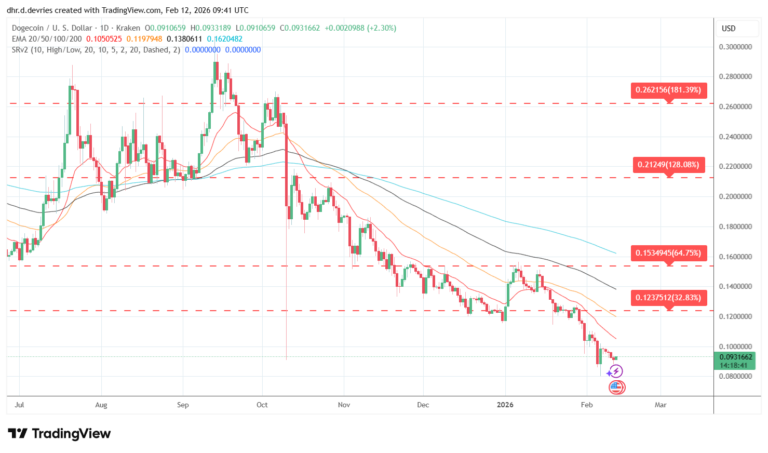Land Informatie
Extra Informatie
Website
Extra Links
Social Media & Nieuws
Ranking
Blockchain overzicht
Categorie:
| Naam | Categorie |
|---|
Veelgestelde vragen
Description
Disclaimer: The regulatory information provided below is for general informational purposes only and may not reflect the most current legal developments. Cryptocurrency regulations are rapidly evolving and can change frequently. This information should not be considered legal or tax advice. Before making any business or investment decisions, please consult with qualified legal, tax, or financial professionals familiar with your specific jurisdiction and circumstances. Always verify current regulations with official government sources and regulatory bodies.
Legal Classification & Regulatory Framework
Cryptocurrency Status
Azerbaijan maintains a notably ambiguous legal stance toward cryptocurrencies, positioning them in what is commonly described as a “legal gray area.” Cryptocurrencies are neither explicitly prohibited nor officially recognized under Azerbaijani law. The country’s constitution establishes the Azerbaijani manat as the sole legal tender, and the Central Bank of Azerbaijan has consistently stated that cryptocurrencies like Bitcoin are not recognized as legal methods of payment or official currency within the jurisdiction.
Despite this lack of formal recognition, cryptocurrency-related activities such as trading, mining, and holding digital assets are not prohibited by law. This creates a practical environment where individuals and entities can engage with cryptocurrencies without facing criminal penalties, though they operate without the protections and clarity that comprehensive regulation would provide. The absence of specific cryptocurrency legislation means that existing financial laws may theoretically apply to certain crypto activities. However, their scope remains limited as cryptocurrencies do not fit traditional legal definitions of foreign currency or financial instruments.
The only explicit legislative mention of cryptocurrencies appears in the Central Bank of Azerbaijan’s “Regulations on margin trading,” which defines cryptocurrency as a digital currency and establishes leverage limits for financial derivatives based on virtual currencies. This limited regulatory acknowledgment indicates awareness of cryptocurrency’s existence within the financial system, yet it stops short of providing a comprehensive legal framework. The Central Bank has issued public warnings about the volatility and risks associated with cryptocurrencies, adopting a conservative and cautionary approach that emphasizes potential dangers rather than opportunities.
This regulatory ambiguity creates both challenges and opportunities for market participants. While businesses can operate without navigating complex licensing requirements, they also lack legal clarity regarding their rights, obligations, and protections under Azerbaijani law. This uncertainty particularly affects international businesses considering Azerbaijan as a market entry point or local enterprises seeking to integrate cryptocurrency into their operations.
Tax Treatment
Despite the absence of specific cryptocurrency legislation, Azerbaijan’s tax authorities have established clear expectations regarding the taxation of cryptocurrency-related income. The Ministry of Taxes and the State Tax Service have confirmed that all profits and income derived from cryptocurrency activities are subject to taxation under the existing Azerbaijani Tax Code. This treatment of cryptocurrency income as taxable represents an important clarification that distinguishes legal economic activity from illegal operations.
Tax authorities classify cryptocurrency trading income as e-commerce transactions rather than illegal income, which carries significant implications. This classification indicates official recognition that cryptocurrency activities constitute legitimate economic activity subject to standard taxation rather than penalties for illegal conduct. Income from buying, selling, or trading cryptocurrencies must be declared and is subject to applicable income tax rates. The specific tax rate depends on whether the individual operates as a casual trader or engages in professional commercial trading activity.
For cryptocurrency mining operations, Azerbaijan has implemented a distinctive approach based on electricity consumption. Miners are required to register as individual entrepreneurs and become subject to a fixed tax rate calculated according to their electricity usage and operational scale. This taxation structure effectively legalizes mining activities while providing the government with a straightforward mechanism for tax collection based on measurable inputs rather than volatile cryptocurrency values. The electricity-based taxation model reflects practical recognition of mining’s energy-intensive nature and provides a stable revenue stream for government coffers.
Value Added Tax treatment of cryptocurrency transactions follows specific guidelines. The sale and exchange of cryptocurrencies themselves are generally exempt from Azerbaijan’s standard VAT rate. However, services related to cryptocurrency transfers, such as fees charged by local exchange platforms, may be subject to VAT at the standard rate. Additionally, importing hardware for mining operations may attract customs duties and VAT, impacting the overall cost structure for mining enterprises. Businesses involved in cryptocurrency-related services must carefully analyze their activities to determine appropriate VAT obligations.
While tax authorities have provided general guidance on cryptocurrency taxation, certain areas remain unclear. The treatment of losses, specific valuation methods for tax basis calculations, and detailed rules for complex transaction types have not been comprehensively addressed. This partial clarity means that cryptocurrency users and businesses must exercise caution and maintain thorough documentation of all transactions to support tax filings and potential audits.
Regulatory Oversight
Multiple Azerbaijani government agencies share responsibility for overseeing different aspects of cryptocurrency activities, though no single body exercises comprehensive regulatory authority over the digital asset sector. The Central Bank of Azerbaijan holds exclusive authority over the national currency and monetary policy. While the Central Bank does not regulate cryptocurrencies as payment instruments, it has issued warnings about cryptocurrency risks and established rules for margin trading involving crypto-based financial derivatives. The bank’s conservative stance reflects concerns about financial stability, consumer protection, and the potential use of cryptocurrencies for illicit purposes.
The Financial Monitoring Service (FMS), established as Azerbaijan’s Financial Intelligence Unit, plays a crucial role in anti-money laundering and counter-terrorism financing enforcement. The FMS mandates that financial sector participants and cryptocurrency market participants implement Know Your Customer procedures and digital verification processes to prevent illicit activities. Following the introduction of enhanced anti-money laundering legislation, businesses in the cryptocurrency sector must adhere to stricter compliance requirements. The FMS requires suspicious transaction reporting within three business days and mandates that records be maintained for at least five years, with extensions possible upon regulatory request.
The State Tax Service enforces tax collection and ensures compliance with the Azerbaijani Tax Code regarding cryptocurrency-related income. Tax authorities are responsible for collecting appropriate income or profit taxes on earnings from crypto activities and have guided how cryptocurrency income should be reported and taxed. The Ministry of Taxes works in coordination with other agencies to monitor cryptocurrency transactions and ensure proper tax treatment.
The Financial Markets Supervision Authority, established to enhance oversight of the financial sector, has responsibilities for licensing and supervising securities markets, investment funds, and insurance. While its specific role regarding cryptocurrencies remains limited due to the absence of comprehensive crypto legislation, the FMSA participates in the broader financial regulatory framework that may intersect with cryptocurrency activities. Other agencies, including the Anti-Corruption Commission, Ministry of National Security, and State Customs Committe,e also have roles in combating money laundering and monitoring financial activities that may involve cryptocurrencies.
Business Environment
Banking Relationships
The relationship between traditional banking institutions and cryptocurrency businesses in Azerbaijan remains underdeveloped and challenging. Unlike some jurisdictions where major banks have embraced cryptocurrency through partnerships with digital asset platforms, Azerbaijani banks maintain a cautious and conservative approach toward the crypto sector. The Central Bank’s warnings about cryptocurrency risks and the absence of clear regulatory frameworks create hesitancy among traditional financial institutions to provide services to cryptocurrency-related businesses.
Cryptocurrency businesses operating in Azerbaijan often face difficulties accessing basic banking sservicess,ncluding business accounts, payment processing, and international wire transfers. This challenge reflects broader global patterns where banks view cryptocurrency-related activities as high-risk due to concerns about anti-money laundering compliance, regulatory uncertainty, and reputational considerations. The lack of specific licensing requirements and regulatory clarity for cryptocurrency exchanges and service providers compounds banks’ reluctance to establish relationships with these entities.
For individuals engaging in cryptocurrency transactions, the situation presents fewer obstacles. Residents can typically use personal bank accounts to transfer funds to international cryptocurrency exchanges or platforms that accept Azerbaijani manat deposits. However, banks may scrutinize large or frequent transfers related to cryptocurrency purchases, and some institutions may impose restrictions on transactions they identify as crypto-related. The absence of local cryptocurrency exchanges with full banking integration means that many Azerbaijani cryptocurrency users rely on international platforms and peer-to-peer transactions.
The regulatory framework governing foreign currency operations permits residents to conduct certain international transactions, which creates pathways for cryptocurrency-related fund transfers. However, these operations must comply with existing rules established by the Central Bank regarding foreign currency transactions by residents and non-residents. The combination of limited banking access, lack of regulatory clarity, and institutional conservatism creates a challenging environment for cryptocurrency businesses seeking to establish professional operations with proper financial infrastructure in Azerbaijan.
Licensing Requirements
Azerbaijan currently lacks specific licensing requirements tailored to cryptocurrency businesses, reflecting the broader absence of comprehensive cryptocurrency legislation. Unlike jurisdictions that have established detailed frameworks requiring cryptocurrency exchanges, wallet providers, and other crypto service providers to obtain specialized licenses, Azerbaijan has not implemented such requirements. This regulatory gap means that cryptocurrency businesses can potentially operate without sector-specific authorization, though they remain subject to general business registration requirements and applicable financial regulations.
Any individual or legal entity conducting commercial activities in Azerbaijan must comply with standard business registration procedures. Cryptocurrency-related businesses would need to register as legal entities and obtain appropriate business licenses depending on their specific activities. The Azerbaijan Service and Assessment Network service centers issue business licenses with indefinite validity, and authorities have streamlined the licensing regime to reduce bureaucratic burdens. However, these general business requirements do not address the specific characteristics and risks associated with cryptocurrency operations.
While specific cryptocurrency licensing frameworks do not exist, existing financial services regulations may apply to certain cryptocurrency activities depending on their characteristics. Activity involving money transmission, currency exchange, or investment services may potentially trigger requirements under banking laws, payment services regulations, or securities laws. The Central Bank’s regulations on margin trading apply to financial derivatives based on cryptocurrencies. However, the absence of clear guidance on how these existing frameworks apply to cryptocurrency businesses creates legal uncertainty.
The Financial Monitoring Service’s anti-money laundering requirements effectively impose compliance obligations on cryptocurrency market participants even in the absence of formal licensing. Entities engaged in cryptocurrency activities must implement Know Your Customer procedures, transaction monitoring, and suspicious activity reporting to comply with AML/CTF regulations. This creates a de facto regulatory burden that, while not constituting formal licensing, requires cryptocurrency businesses to establish compliance programs similar to those of traditional financial institutions.
Innovation Support
Azerbaijan has demonstrated notable interest in blockchain technology and digital transformation, though this enthusiasm has not extended equally to cryptocurrency adoption. The government has pursued several ambitious initiatives focused on implementing blockchain infrastructure in public sector operations, reflecting a sophisticated understanding of distributed ledger technology’s potential benefits while maintaining caution about cryptocurrencies themselves.
The most significant blockchain initiative involved a comprehensive partnership between the Central Bank of Azerbaijan and IBM to implement blockchain technology across various aspects of the economy. This multi-year program focused on the digital transformation of the banking sector, including the development of a blockchain-based digital identification system. Built on the Hyperledger Fabric protocol with hardware infrastructure provided by Lenovo Professional Services, this initiative represented one of the most ambitious government blockchain implementations in the region. The identification system aimed to enable digital banking services, boost the cashless economy, and provide transparent, accessible digital services to citizens.
The State Customs Committee partnered with IBM to implement blockchain technology for customs procedures, specifically targeting cargo transportation and creating an online-accessible database for trade documentation. This initiative aimed to improve transparency, reduce opportunities for corruption, and enhance the quality of customs services for both government authorities and entrepreneurs. Plans for cross-border blockchain integration with neighboring countries, including Moldova, Ukraine, and Georgia, demonstrated Azerbaijan’s ambition to position itself as a regional leader in blockchain adoption for government operations.
Azerbaijan’s Ministry of Economy has explored blockchain applications for improving transparency in economic transactions and public services. The Digital Trade Hub, an electronic public-private partnership platform, aims to facilitate e-commerce development and provide local producers with access to international markets through digitalized documentation processes. The country has also hosted blockchain-focused conferences and events, including the “Chain Reaction,,” hich focuses on blockchain, Web3, artificial intelligence, and digital assets, signaling openness to industry dialogue.
However, this government enthusiasm for blockchain technology has not translated into supportive policies for cryptocurrency businesses. The Central Bank’s conservative stance on cryptocurrencies, combined with the absence of regulatory frameworks to facilitate crypto business operations, creates a disconnect between blockchain innovation in government sectors and cryptocurrency development in private markets. Azerbaijan has not established regulatory sandboxes specifically for cryptocurrency businesses, nor has it implemented programs to support cryptocurrency startups or attract international crypto companies.
Market Characteristics
Adoption Patterns
Cryptocurrency adoption in Azerbaijan exhibits patterns typical of emerging markets with regulatory uncertainty: growing grassroots interest among tech-savvy populations combined with limited mainstream penetration and minimal institutional involvement. The absence of official recognition and regulatory clarity has notprevented a significant numbers of Azerbaijanis from engaging with cryptocurrencies althoughh adoption remains concentrated among younger, more technologically literate demographics rather than spreading broadly across society.
Individual cryptocurrency ownership in Azerbaijan remains relatively modest compared to more developed crypto markets, though precise statistics are difficult to obtain given the absence of regulatory reporting requirements. Bitcoin, Ethereum, and other major cryptocurrencies attract the most interest due to their international recognition and established infrastructure. Users typically access cryptocurrencies through international exchanges and platforms rather than domestic services, reflecting the underdevelopment of local cryptocurrency infrastructure. The presence of Bitcoin ATMs in some locations provides additional access points, though their use remains limited.
Cryptocurrency adoption motivations in Azerbaijan mirror global patterns: speculation on potential price appreciation, desire for alternative investment vehicles outside traditional financial systems, interest in technological innovation, and, in some cases, facilitation of international transactions. The relative instability of the national currency during certain periods has occasionally driven interest in cryptocurrencies as stores of value, though this remains a secondary consideration for most users. Young professionals and technology workers represent the core demographic of cryptocurrency users, with significantly lower adoption among older generations.
Merchant acceptance of cryptocurrencies for payments remains virtually non-existent in Azerbaijan’s retail environment. The Central Bank’s stance that cryptocurrencies are not legal tender, coupled with the lack of regulatory frameworks to safeguard merchants accepting digital assets, presents significant disincentives for businesses to adopt cryptocurrency payments. Most cryptocurrency activity in Azerbaijan consists of investment and trading rather than use as a medium of exchange for goods and services. The dominance of cash in everyday transactions, combined with the government’s push toward cashless payments using the manat, further reduces incentives for cryptocurrency payment adoption.
Institutional cryptocurrency adoption in Azerbaijan remains minimal. Traditional financial institutions avoid cryptocurrency involvement due to regulatory uncertainty and Central Bank conservatism. Institutional investors lack clear legal frameworks for cryptocurrency holdings, and pension funds, insurance companies, and other regulated entities have no pathway to incorporate digital assets into their portfolios. Some technology startups and businesses in the oil and gas sector have explored blockchain applications and cryptocurrency fundraising mechanisms, demonstrating emerging corporate interest despite regulatory obstacles.
Industry Focus
Azerbaijan’s cryptocurrency industry remains in early developmental stages, characterized more by individual participation in global cryptocurrency markets than by thriving local businesses or infrastructure. The absence of comprehensive regulation, challenges in banking relationships, and a alack of government support programs have prevented the emergence of a robust domestic cryptocurrency ecosystem comparable to more developed markets. Most cryptocurrency-related economic activity involves Azerbaijani users interacting with international platforms rather than locally-based services.
International cryptocurrency exchanges dominate the market for Azerbaijani users, with platforms that accept deposits in Azerbaijani manat or facilitate convenient fiat on-ramps attracting the most users. These foreign platforms operate without local presence or licensing, serving Azerbaijani customers remotely. The absence of prominent Azerbaijani-founded cryptocurrency exchanges or major crypto businesses reflects both the challenging regulatory environment and the relatively small market size. Some local technology companies have explored blockchain applications, particularly in supply chain management for Azerbaijan’s critical oil and gas sector, though these remain pilot projects rather than scaled commercial operations.
Cryptocurrency mining has attracted attention in Azerbaijan, driven by the country’s energy resources and relatively favorable electricity costs in certain regions. Miners must register as individual entrepreneurs and comply with electricity-based taxation, creating a more formalized framework than exists for other cryptocurrency activities. However, mining operations remain small to medium scale, and Azerbaijan has not emerged as a significant global mining hub. The government’s tax approach suggests pragmatic acceptance of mining as an economic activity while extracting revenue through the electricity consumption model.
Blockchain technology development for non-cryptocurrency applications represents an area where Azerbaijan has shown greater sophistication and activity. Government initiatives to implement blockchain in customs, banking, and digital identification demonstrate technical capacity and understanding of the potential of distributed ledger technology. Some local technology firms have developed expertise in blockchain implementation, creating opportunities for B2B services and government contracts. This blockchain development focus, separate from cryptocurrency applications, reflects the government’s selective approach to the technology.
The absence of cryptocurrency-focused financial services, including custody solutions, professional trading platforms, and institutional-grade infrastructure, highlights the early-stage nature of Azerbaijan’s crypto market. Legal, accounting, and consulting services specifically tailored to cryptocurrency businesses remain limited, reflecting both low demand and the complexity of operating in an ambiguous regulatory environment. As regulations evolve and clarity improves, opportunities may emerge for professional service providers and infrastructure companies.
Regulatory Evolution
Azerbaijan’s regulatory approach to cryptocurrencies has evolved from initial skepticism and warnings toward gradual acknowledgment and tentative steps toward potential regulation, though comprehensive legislative frameworks remain absent. The regulatory journey reflects tension between technological curiosity demonstrated in government blockchain initiatives and conservative financial oversight concerned about risks to monetary sovereignty, consumer protection, and financial stability.
Early official cryptocurrency engagement consisted primarily of warnings from the Central Bank about volatility and risks, with authorities emphasizing potential dangers rather than opportunities. The establishment of basic tax treatment for cryptocurrency income represented an important milestone, signaling official recognition that crypto activities constitute legitimate economic transactions subject to taxation rather than illegal conduct requiring prohibition. This tax clarification provided minimal but meaningful guidance for market participants while generating government revenue from growing cryptocurrency activity.
The introduction of enhanced anti-money laundering legislation brought cryptocurrency businesses more explicitly within the compliance framework, requiring implementation of Know Your Customer procedures and suspicious transaction reporting. This regulatory development reflects international pressure from bodies, including the Financial Action Task Force, to address money laundering and terrorism financing risks associated with cryptocurrencies. Azerbaijan’s partial compliance with FATF recommendations and ongoing efforts to strengthen AML/CTF frameworks influence cryptocurrency oversight even in the absence of dedicated crypto legislation.
Government discussions about developing comprehensive cryptocurrency regulatory frameworks have occurred periodically, with officials acknowledging the need for clear legal structures to support digital economy development. However, these discussions have not yet translated into enacted legislation, and the timeline for implementing dedicated cryptocurrency laws remains uncertain. The government’s cautious approach prioritizes careful study of international regulatory models and assessment of risks before committing to specific frameworks. This deliberate pace contrasts with the rapid blockchain implementation in government operations, highlighting the distinction authorities draw between distributed ledger technology and cryptocurrencies.
Looking forward, Azerbaijan’s regulatory evolution will likely be influenced by several factors: international developments in cryptocurrency regulation, particularly frameworks adopted by major economies and international organizations; economic considerations including potential benefits from cryptocurrency business attraction and tax revenues; technological developments that may create new opportunities or risks requiring regulatory responses; and Azerbaijan’s broader economic diversification goals beyond oil and gas dependence. The government has identified information and communications technology as a priority sector for economic development, creating potential alignment between cryptocurrency industry growth and national economic objectives.
The regulatory trajectory will probably involve gradual formalization rather than dramatic policy shifts. Potential developments could include the establishment of licensing requirements for cryptocurrency exchanges and service providers, clearer tax guidelines addressing specific transaction types and valuation methods, enhanced consumer protection measures, and possibly regulatory sandboxes to facilitate controlled experimentation with cryptocurrency business models. However, the conservative stance of the Central Bank and ongoing concerns about financial stability suggest that any regulatory frameworks adopted will emphasize oversight, compliance, and risk management rather than promotional policies.
For Current Information:
Central Bank of the Republic of Azerbaijan:
https://www.cbar.az/home?language=en
Ministry of Taxes of the Republic of Azerbaijan:
https://www.taxes.gov.az/en
Financial Monitoring Service of the Republic of Azerbaijan:
https://www.fmc.gov.az/en/
Financial Markets Supervision Authority (FMSA):
https://www.fimsa.az/en
Ministry of Economy of the Republic of Azerbaijan:
https://www.economy.gov.az/en
Ministry of Digital Development and Transport:
https://mincom.gov.az/en
Landkaart
Artikelen over crypto en blockchain

Wat zijn E-Money Tokens?

Wat is BIP‑444?

Wat is een Hash in Proof of Work (PoW)?


Wat is Base (Ethereum L2)?

Xgram.io Lanceert Private ETH naar XMR Swaps

Wat zijn E-Money Tokens?

Wat is BIP‑444?

Wat is een Hash in Proof of Work (PoW)?
Persberichten en bijdragen


INVESTING YACHTS Lanceert RWA Jachtverhuurmodel




BLUFF Haalt $21 Miljoen Op om Inzetinnovatie te Stimuleren










